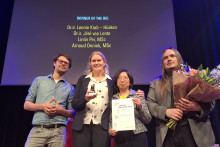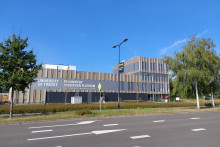Chinese students form a substantial part of the international community at the University of Twente. Looking back at the summer games, four Chinese students shared their insights and views about their homeland. Have the Olympics changed China?
Jun Liu, a PhD student at the Department of Tissue Regeneration (TR) is optimistic, and she thinks the year 2008 will go down in history books as the year that China made huge progress in some sports like rowing, boxing and synchronized swimming, games that are not generally considered to be a stronghold for Chinese athletes.
She admitted to China's unsettling problems of severe air pollution and certain worker's rights issues. `Every Chinese person,' she said, `believes these issues will gradually change and improve.' According to Liu, all the infrastructures developed for the Olympic Games will help to better train the Chinese athletes of the future, especially in some sports where the Chinese did not perform well like cycling and track-and-field events. Her friend, who was a volunteer in Beijing for the Olympics, told Liu that this event has bolstered the sense of pride and patriotism that the Chinese have for their country.
Ling Wu, another PhD student at the Department of Tissue Regeneration echoed her sentiments. He said that though the Government spent billions of dollars for the Olympics, it was fully justified, as the event was watched by billions of people around the globe. Over 200 nations participated in the Olympics, and world leaders graced the opening ceremony. `It was essential for China to portray the right image,' said Wu.
As for the Chinese economy, he fully agreed that the Olympics gave the economy a big boost. In the long run, he foresees that China will earn back the money it spent and probably exceed that amount. He pointed out that China has also excelled in various academic Olympiads, and the government has placed a high priority on educating more scientists and engineers. As an indication of this emphasis, China will be launching its third manned space craft next month. `I think that the Chinese Government knows what it is doing,' he said. If the 2007 GDP growth of 11.4% is anything to go by, then Ling has definitely hit the bull's eye.
Yan Song, a PhD student at the Polymer Chemistry and Biomaterials Department (PBM), thinks the Olympics can possibly teach a valuable lesson to the Chinese. She felt that instead of accepting the comments made by the western media, portraying China in a negative manner, China should instead work towards making the country an even better place. She said, `China has enormous potential, and the Olympics helped to bring China to the center stage.'
Chinese student Bin Ma, a PhD student in the Department of Tissue Regeneration, summed it all up. `Hosting the Olympics posed a huge challenge to China. But none of the potential nightmares came true. Plenty of world leaders attended the opening ceremony. Not a single country boycotted the Games. Beijing's pollution did not force any endurance events to be postponed. Protesters did not disrupt any Olympic events. Chinese athletes won more gold medals than anyone else. It has been just 24 years since China's first entry into the Olympics and it is already leading the way. In 2008, China dazzled and the world watched!'
 |
| Proud Chinese students at the UT: (left to right) Yang Song, Ling Wu, Jun Liu, Bin Ma and Liang. (Foto: Gijs van Ouwerkerk) |







